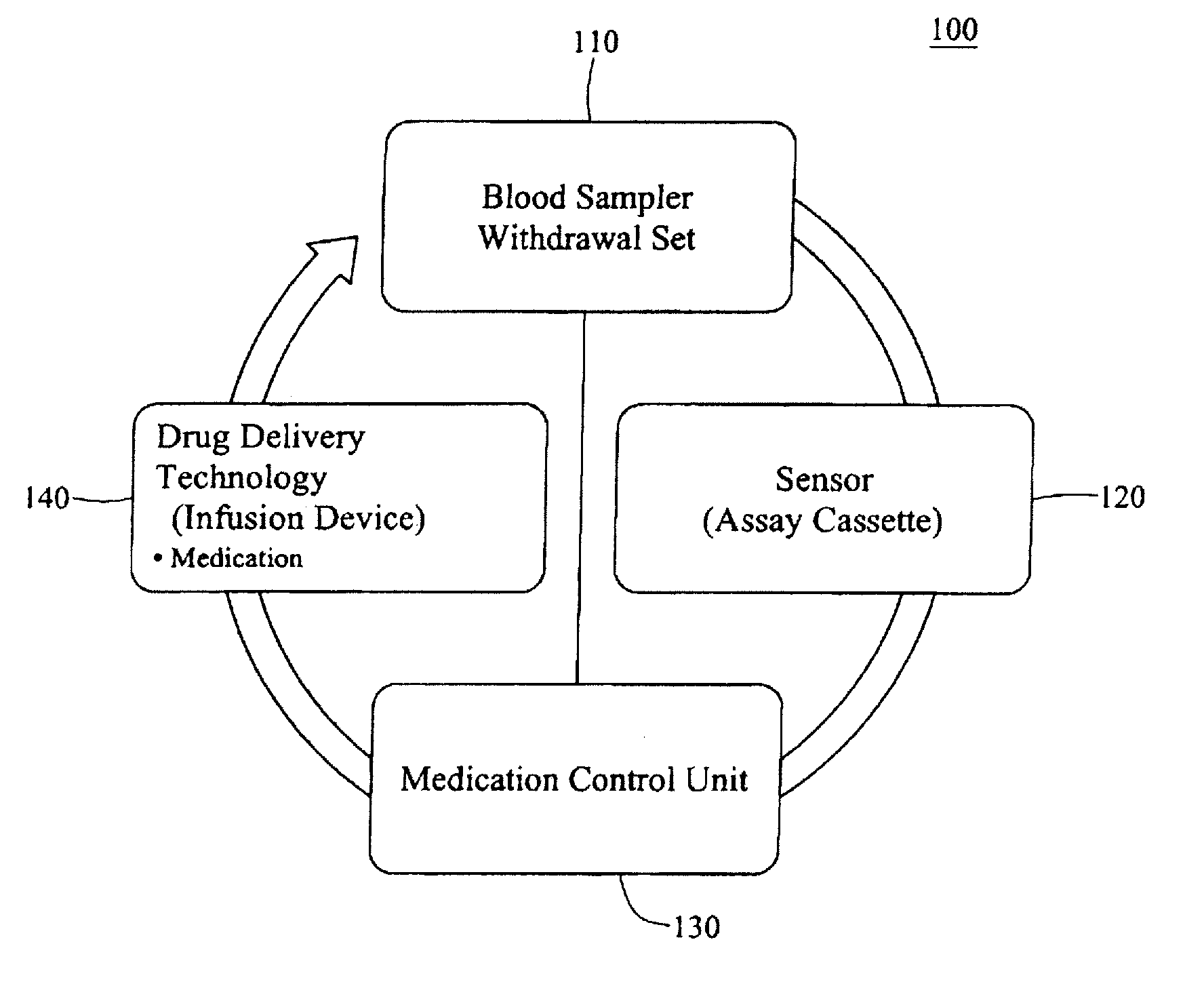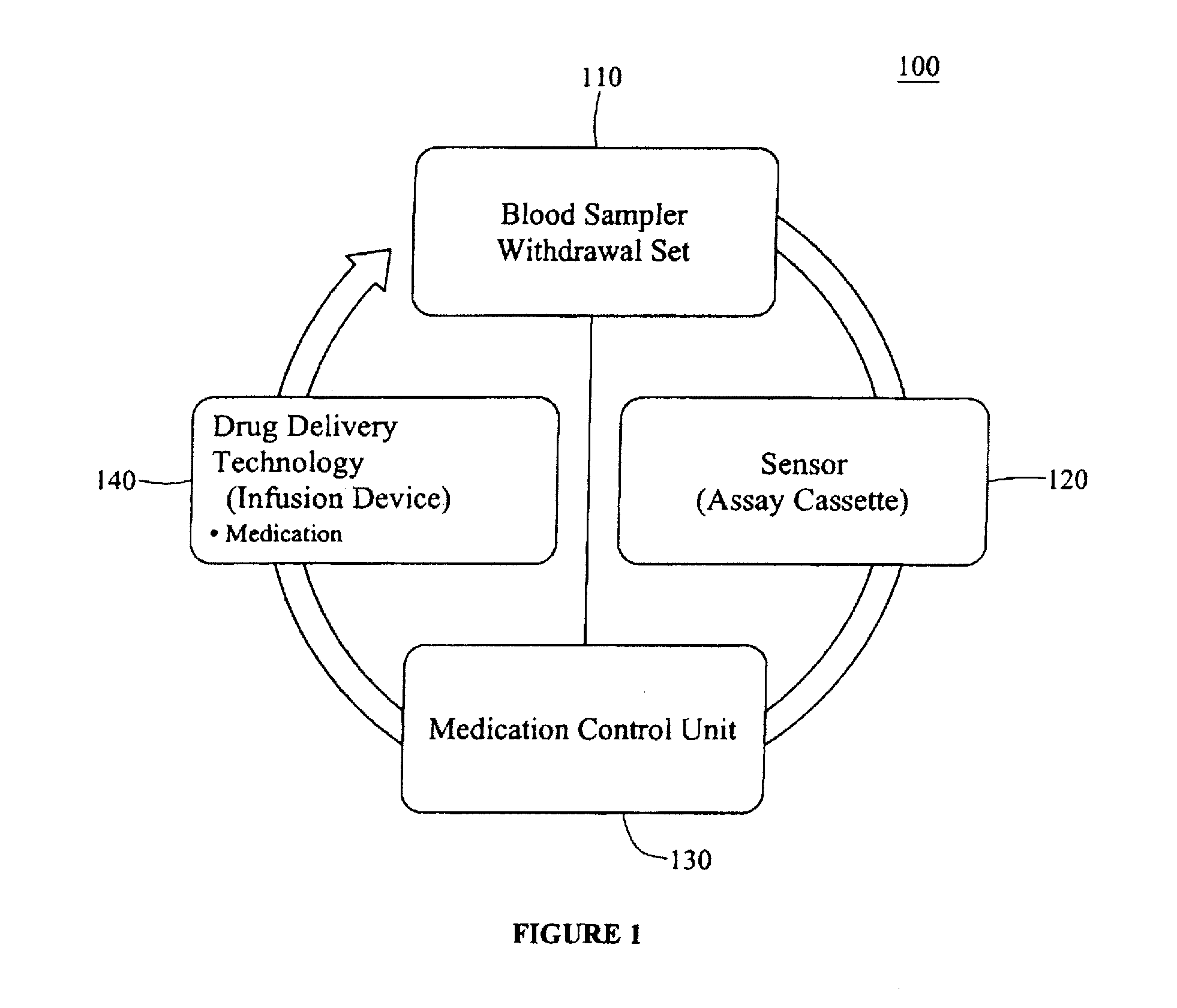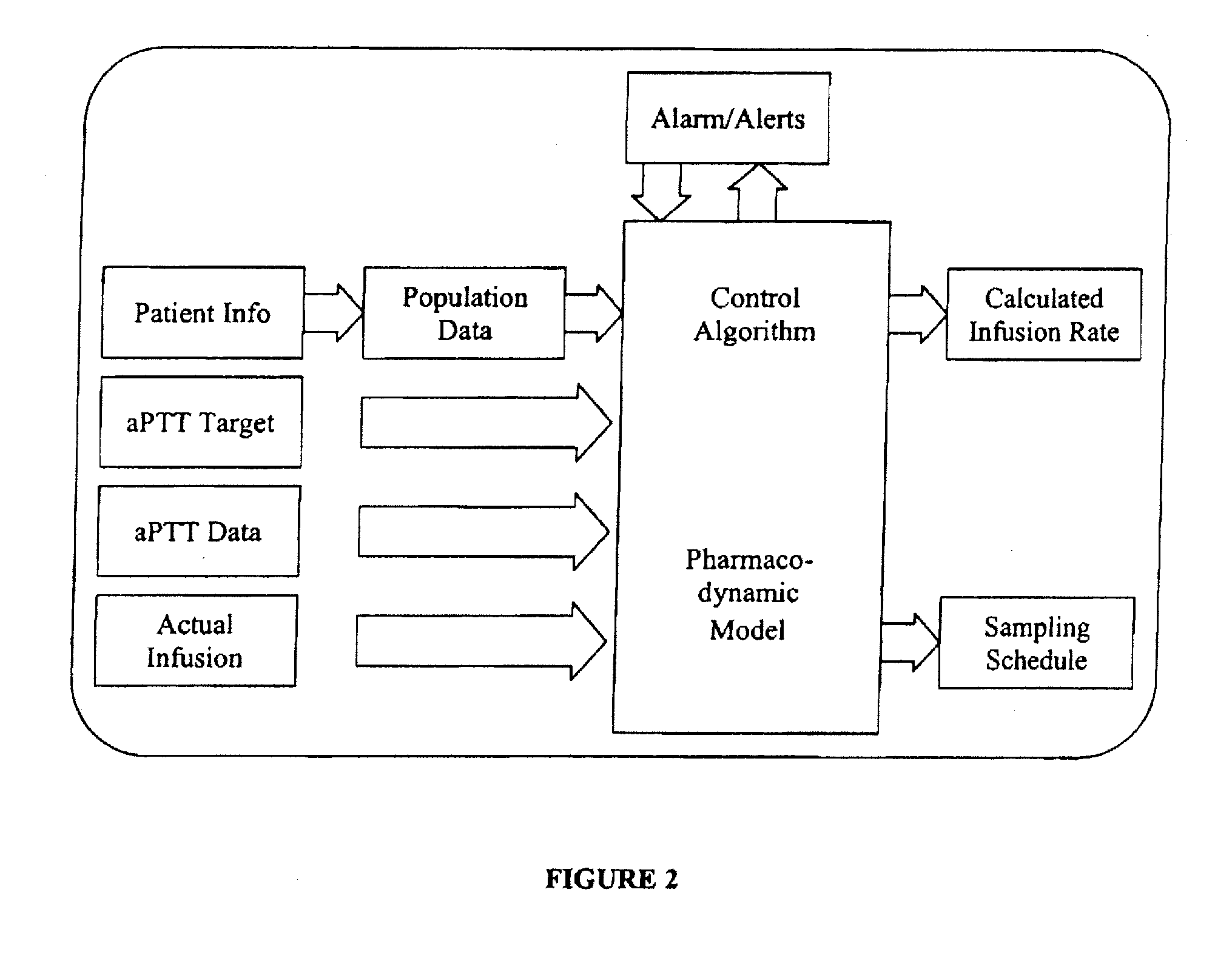Integrated patient management and control system for medication delivery
Inactive Publication Date: 2010-10-28
AUTOMEDICS MEDICAL SYST
View PDF0 Cites 160 Cited by
- Summary
- Abstract
- Description
- Claims
- Application Information
AI Technical Summary
Benefits of technology
[0032]In another embodiment, a control system and methods for automatic feedback control of delivery of a drug, such as heparin, are provided. The goal of a heparin control system specifically is to maintain the anticoagulation state of a patient within the prescribed safe limits. The system accomplishes this goal by calculating the appropriate infusion times and rates based on aPTT measurements that are made following each heparin infusion. The infusion rate calculated by the heparin control system is based on a pharmacodynamic (PD) model of heparin response. Based on measurements of patient response, the model parameters can be adjusted (using, for example, Bayesian estimation). In addition, a confidence interval that reflects the individual patient's variability in response to heparin infusions can also be assessed and constantly updated, either continuously or at periodic intervals, as part of the feedback loop. The goal of the system is to keep aPTT within the proscribed confidence limit for each patient. This constant updating function is a main contributor to the high quality of control that can be achieved.
Problems solved by technology
This complex process leads to frequent human error, thus only 35%-50% of patients are within a safe range of heparin at any given time.
The consequences of both under- and over-anticoagulation include death, heart attack, stroke, moderate to severe blood loss, tremendous strain on the patient and their loved ones, and millions of dollars in avoidable health care costs.
The attempts have yielded little if any improvement.
The consequences of too high or too low a level of anticoagulation can be serious.4 In patients with acute ischemic syndromes, inadequate anticoagulation may lead to recurrent thrombosis, and significant bleeding has occurred in patients at supra-therapeutic doses of heparin.
Heparin dosing can be complicated by a number of factors, including illness that it is being used to treat.
Heparin is associated with many medication errors as a result of its complex pharmacologic response and large inter-patient variability in response.
A majority of these errors resulted from a failure to follow procedures and protocols.11 These errors all result in significant economic costs to the health care system.
Current practices for the administration of heparin in an acute care setting involve many different steps and resources that can easily tax the hospital staff and lead to human error.
Nevertheless, recent reviews have concluded that many users of smart pumps bypass the safety features of the devices, and as a result medication errors continue to occur.19
Hospitals are increasingly concerned about medication errors.
There are many unique and important obstacles presented in effective treatment utilizing a closed-loop drug delivery system, especially for the administration of heparin.
For example, there is potentially a time delay for the effect of the administration on the systemic coagulation status, that being the time between the peripheral administration of the heparin and the physiological coagulation cascade.
Second, it is well documented that different patients respond differently to a given drug amount, making response predictability more difficult.
Third, as the disease condition or physiology of the patient changes, the response to the drug may change during the application of the drug.
Finally, monitoring the response of the drug administration requires an analytical test on a blood sample requiring an intermittent sampling scheme since no continuous measurements of this physiological response are currently available.
Method used
the structure of the environmentally friendly knitted fabric provided by the present invention; figure 2 Flow chart of the yarn wrapping machine for environmentally friendly knitted fabrics and storage devices; image 3 Is the parameter map of the yarn covering machine
View moreImage
Smart Image Click on the blue labels to locate them in the text.
Smart ImageViewing Examples
Examples
Experimental program
Comparison scheme
Effect test
second embodiment
[0074]in a second embodiment, applying pressure to cuff distal to catheter, keeping the pressure below the diastolic pressure,
third embodiment
[0075]in a third embodiment, for a distal location, use a pressure above diastolic pressure, or for a proximal approach uses a pressure above systolic pressure.
the structure of the environmentally friendly knitted fabric provided by the present invention; figure 2 Flow chart of the yarn wrapping machine for environmentally friendly knitted fabrics and storage devices; image 3 Is the parameter map of the yarn covering machine
Login to View More PUM
| Property | Measurement | Unit |
|---|---|---|
| Time | aaaaa | aaaaa |
| Area | aaaaa | aaaaa |
| Threshold limit | aaaaa | aaaaa |
Login to View More
Abstract
An integrated patient monitoring and control system is provided which includes a closed-loop control system for monitoring and adjusting the heparin infusion rate for a patient. The system includes a processor which uses a dynamic patient model that is continuously adjusted based on the patient's aPTT measurements to calculate an optimal heparin infusion rate to achieve an operator-input aPTT target range. The processor also includes a forecasting model to calculate the optimum sample time interval for measuring the patient's aPTT to calculate a new infusion rate. An automated sampling system, which includes a storage device for storing a series of assay devices, an advancement mechanism for moving the assay devices to a sample area, and a measurement device for analyzing a sample dispensed on the assay, is provided. The sampling system is used to repeatedly measure the patient's aPTT according to the sample time interval determined by the processor.
Description
RELATED APPLICATION INFORMATION[0001]This application claims priority to and benefit of U.S. Provisional Application Ser. No. 61 / 171,904, filed Apr. 23, 2009, entitled “Automated Assay System for Closed-Loop Drug Delivery” and U.S. Provisional Application Ser. No. 61 / 172,433, filed Apr. 24, 2009, entitled “Systems and Apparatus for Automatic Closed-loop Heparin Delivery,” the content of which is incorporated by reference herein in their entirety as if fully set forth herein.[0002]This application is related to U.S. Provisional Application Ser. No. 61 / 086,383, filed Aug. 5, 2008 (our Reference 037,028-002); U.S. Utility application Ser. No. 12 / 534,447, filed Aug. 3, 2009 (our Reference 037,028-006); U.S. Provisional Application Ser. No. 61 / 139,826, filed Dec. 12, 2008 (Our Reference 037,028-003); and U.S. Utility application Ser. No. 12 / 643,398, filed Dec. 11, 2009 (Our Reference 037,028-008), each of which are incorporated herein by reference in their entirety as if fully set forth ...
Claims
the structure of the environmentally friendly knitted fabric provided by the present invention; figure 2 Flow chart of the yarn wrapping machine for environmentally friendly knitted fabrics and storage devices; image 3 Is the parameter map of the yarn covering machine
Login to View More Application Information
Patent Timeline
 Login to View More
Login to View More IPC IPC(8): C12Q1/56G01N33/00A61K31/727G16H20/17
CPCA61B5/02152G06F19/3468A61B5/1427A61B5/14503A61B5/14546A61B5/155A61B5/4839A61M5/1723A61M2005/14208A61M2205/18A61M2205/6054A61M2205/6063G06F19/3437G06F19/345A61B5/0225A61B5/15003A61B5/150213A61B5/150358A61B5/15074A61B5/150786A61B5/157G16H50/50G16H50/20G16H20/17
Inventor VALCKE, CHRISTIAN P.GORIN, MICHAELGHARIB, JAMES E.
Owner AUTOMEDICS MEDICAL SYST
Features
- R&D
- Intellectual Property
- Life Sciences
- Materials
- Tech Scout
Why Patsnap Eureka
- Unparalleled Data Quality
- Higher Quality Content
- 60% Fewer Hallucinations
Social media
Patsnap Eureka Blog
Learn More Browse by: Latest US Patents, China's latest patents, Technical Efficacy Thesaurus, Application Domain, Technology Topic, Popular Technical Reports.
© 2025 PatSnap. All rights reserved.Legal|Privacy policy|Modern Slavery Act Transparency Statement|Sitemap|About US| Contact US: help@patsnap.com



